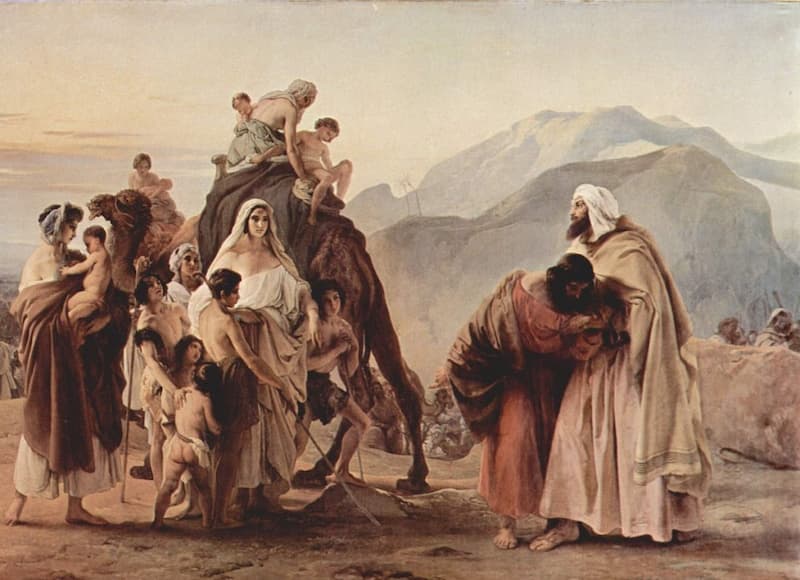Are You Really Sorry?
By Rabbi Haim Ovadia
The dramatic encounter between Yaakov and Esav provides an insight into the concept of indirect apology. Yaakov goes through the process of apology and forgiveness internally, positioning himself as both the offender and the offended. After he emerges from the process innocent or not guilty, he proceeds to appease the Esav, without ever expressing a genuine apology.
The problematic nature of Yaakov’s apology is highlighted by the Torah’s use of the key word פנים. This word has multiple and related meanings. It means face, as well as being ahead of, or in front of. It also means internal. The word appears seventeen times in the description of Yaakov’s encounter with Esav (Gen. 32:4-33:14).
The many occurrences of this keyword tell us that Yaakov dreaded the encounter mostly because he was going to confront his past actions, face to face, after many years of living in hiding. His offerings are sent as an extension of his personality, of his face, and he wants to tell Esav that he is sorry. He seems to admit that what he did was not right, but at night he is embroiled in a subconscious battle between his own two faces, one representing him and the other his brother, Esav. The battle was a vision and not a reality, and Yaakov was perhaps fighting the mental image he had of his brother. The dreamtime struggle reveals his inner fears and tells us that he constantly doubted his actions.
At a certain point, when the struggle is so intense that it causes Yaakov real physical pain, Yaakov has an epiphany. His years of exile and suffering have expiated for his sin, and so he emerges victorious from the conflict and his brother must forgive him. In his dream, he gives himself an approval for the blessing he took from his brother, and he renames himself Israel.
On the following day, Yaakov faces the real Esav. He is servile and polite, but he never apologizes. He tells Esav: “Please accept my offering, for I have seen your face as the face of God, and you have accepted me.” He is not asking for acceptance. He is making a statement: “It is a done deal. I have already seen you in my dream and solved the matter. All you need to do is take my offering as a token of goodwill.”
Esav presses no more. When his offer to escort Yaakov is rejected, he returns home, only to pack up and leave, years later, because of competition with the flocks of Yaakov. His nation eventually becomes a bitter enemy of Israel, and we cannot help but ask whether a genuine apology could have written an alternative ending to this story.
Questions for Kids: Parashat VaYishlah
- Yaakov sends messengers to Esav. Why?
- When the messengers come back to Yaakov, what do they tell him?
- What does Yaakov think when he hears the messengers?
- Yaakov did three things to prepare for the meeting with Esav. What were those things?
- Who wrestled with Yaakov at night?
- Who won the battle?
- What is the new name given to Yaakov?
- What was the name of the Jewish People in the time of the Torah?
- What happens when Yaakov meets Esav?
- When Yaakov arrives with his family to Beth El, he builds an altar and receives two promises from HaShem. What are they?
- Two things happened to Rachel Immenu on the journey to Beth Lehem. One was good and the other was not good. What were they?
Answer Guide for Parashat VaYishlah
- To find out what are Esav’s plans.
- Esav is coming with 400 men.
- Yaakov thinks that Esav is coming to attack him and that he must prepare.
- a) praying to HaShem; b) sending Esav many gifts; c) getting ready for war.
- A mysterious angel.
- Yaakov.
- Yisrael.
- בְּנֵי יִשְׂרָאֵל – the children of Yisrael.
- They run towards each other, hug, and kiss.
- A) he will inherit the land; B) he will have many descendants.
- A) she had a baby; B) she died while giving birth.
Parasha Pointers: VaYishlah
- The root פני appears in the story of the encounter between Yaacov and Esav 17 times. Can you find them all? What is the significance of this recurring root?
- In 25:30 we are told that Esav was called Edom because of the red stew, in 32:4 Yaacov sends messengers to Esav who lives in the Fields of Edom, but only in 36:6-8 we read about Esav leaving Canaan to settle in Edom. What came first? Esav’s second name, his move to Edom, or the land named after him?
- Is it possible that Yaacov misunderstood Esav’s motives? Maybe Esav came to defend his land because he thought Yaacov is going to attack him and claim the land?
- Points in favor of Esav: he never pursued Yaacov into exile or tried to punish him; when they meet, Esav runs towards Yaacov, hugs and kisses him, and only then Yaacov joins actively; It was Esav who left Canaan and let Yaacov stay in the land.
- In 33:11 Yaacov pleads with Esav to take the offering, but he calls it “blessing” is this an insinuated apology?
- Does Yaacov offer an explicit apology?
- The midrash blames Dinah for being violated by Shekhem. This is an attitude that is still prevalent today and must be addressed. On the other hand, there are those who say that Dinah wanted to stay with Shekhem. Both arguments can be refuted by carefully reading verses 1-5 in chapter 34.
- The התפעל form of the root חתן appears in 34:9. It is interesting to note that in biblical Hebrew להתחתן does not mean to get married, as it is in modern Hebrew. Compare to 1 Sam. 18:21, and to Deut. 7:3. Consider why there is a problem with the way Maimonides uses the verse in Deuteronomy to discuss intermarriage (Issurei Biah, 12:1-4).
- In 34:30 Yaacov is not concerned about the massacre of the people of Shekhem but rather about provoking the surrounding nation. How can we understand his reaction and the insinuated approval of his sons’ actions?
- In 35:2 Yaacov tells his family to get cast away their foreign idols. Some commentators claim that this refers to the objects looted from Shekhem, but the word בתוככם suggests otherwise. Is it possible that Yaacov’s family was drifting away from monotheism? What is the background of that conversation?
- Yaacov’s life is full of stones, some of which are altars and monuments: Gen. 28:11; 28:18-22; 29:2-10; 31:45-46; 35:7 (altar is mentioned, probably made of stones); 35:14; 49:14.
- Yaacov’s life is also marked by several burial sites, not all directly related to burial of relatives: 35:4; 35:8; 35:19-20; 49:31;50:5.
Enjoy reading and learning.
Shabbat Shalom



















